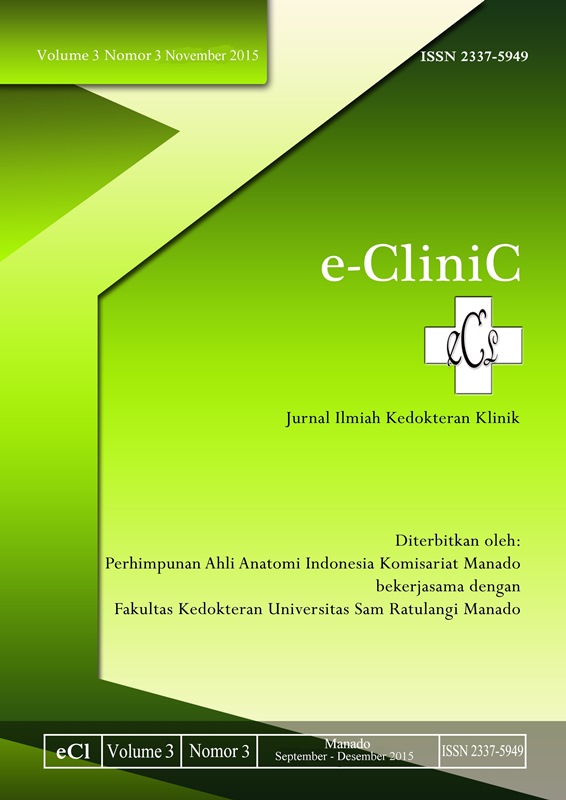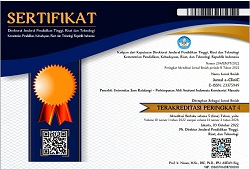PROFIL HEMATOLOGI PADA PENDERITA DIARE AKUT YANG DIRAWAT DI BAGIAN ILMU KESEHATAN ANAK RSUP PROF. DR. R. D. KANDOU MANADO PERIODE NOVEMBER 2010 – NOVEMBER 2011
DOI:
https://doi.org/10.35790/ecl.v3i3.10480Abstract
Abstract: Diarrhea is an abnormal excretion of stool or dilute form of feces with abnormal frequency. Neonatal can be diagnosed with diarhhea when the frequency of bowel movements is more than 4 times per day. In babies aged 1 month old or older, diarhhea is diagnosed when the frequency is more than 3 times per day. Until today, diarrhea is still a health problem in Indonesia as well as in other developing countries. Diarrhea that occurs less than 14 days is called acute diarhhea. There are many causes of diarrhea inter alia infectious and non infectious diseases. The complications of acute diarrhea can be dehydration, hypovolemic shock, hypokalemia, and hypoglycemia. Hematological examination of acute diarrhea patients with severe dehydration can be increased hematocrit and hemoglobin. This study aimed to obtain the hematological results of acute diarrhea patients at the Paediatrics Department of Prof Dr. R. D. Kandou Hospital, Manado. This was a retrospective descriptive study by using medical records. In this study, there were 276 patients in the period November 2010 - November 2011. The results showed that of the 276 patients with acute diarrhea, 157 patients were males (55.88%) and 115 patients were females (43.12%). Concerning the hematological examination, 205 patients (74.27%) had normal hematocrit, 189 patients (68.48%) had normal hemoglobin, and 224 patients (81.16%) had normal leukocyte counts, and 196 patients (71.01%) had normal platelet counts. There were 273 patients (98.91 %) with length of treatment 1 - ≤14 days meanwhile 3 patients (1.09%) with length of treatment >14 days. Keywords: acute diarrhea, hematological examination, children
Abstrak: Diare adalah pengeluaran tinja yang tidak normal atau bentuk tinja yang encer dengan frekuensi lebih banyak dari biasanya. Neonatus dinyatakan diare bila frekuensi buang air besar sudah lebih dari 4 kali, sedangkan bayi berumur lebih dari 1 bulan dan anak, bila frekuensinya lebih dari 3 kali, sampai saat ini, diare masih menjadi masalah kesehatan di Indonesia juga dinegara-negara berkembang, diare disebut akut bila terjadi kurang dari 14 hari, diare dapat disebabkan oleh berbagai hal yaitu infeksi maupun non infeksi, pada diare akut dapat terjadi komplikasi antara lain dehidrasi, renjatan hipovolemik, hipokalemia, hipoglekemia, pemeriksaan hematologi pasien diare akut dapat terjadi peningkatan pada beberapa pemeriksaan darah seperti peningkatan hematokrit dan hemoglobin pada keadaan dehidrasi berat. Penelitian ini bertujuan untuk melihat gambaran hematologi pada pasien diare akut di bagian Ilmu Kesehatan Anak RSUP Prof. Dr. R. D. Kandou Manado. Penelitian ini menggunakan metode deskriptif retrospektif dengan memanfaatkan catatan rekam medik. Sampel penelitian ini 276 pasien dengan diare akut pada periode November 2010 – November 2011. Dari 276 pasien, didapatkan laki-laki 157 (55,88%) pasien dan perempuan 115 (43,12%) pasien. Pada pemeriksan hematologi didapatkan nilai hematokrit normal 205 (74,27%) pasien, hemoglobin normal 189 (68,48%) pasien, hitung leukosit normal 224 (81,16%) pasien, dan hitung trombosit normal 196 (71,01%) pasien. Terdapat 273 (98,91%) pasien dengan lama perawatan 1 - ≤14 hari dan 3 (1,09%) pasien dengan lama perawatan >14 hari.
Kata kunci: diare akut, pemeriksaan hematologi, pasien anak
Downloads
How to Cite
Issue
Section
License
COPYRIGHT
Authors who publish with this journal agree to the following terms:
Authors hold their copyright and grant this journal the privilege of first publication, with the work simultaneously licensed under a Creative Commons Attribution License that permits others to impart the work with an acknowledgment of the work's origin and initial publication by this journal.
Authors can enter into separate or additional contractual arrangements for the non-exclusive distribution of the journal's published version of the work (for example, post it to an institutional repository or publish it in a book), with an acknowledgment of its underlying publication in this journal.
Authors are permitted and encouraged to post their work online (for example, in institutional repositories or on their website) as it can lead to productive exchanges, as well as earlier and greater citation of the published work (See The Effect of Open Access).







